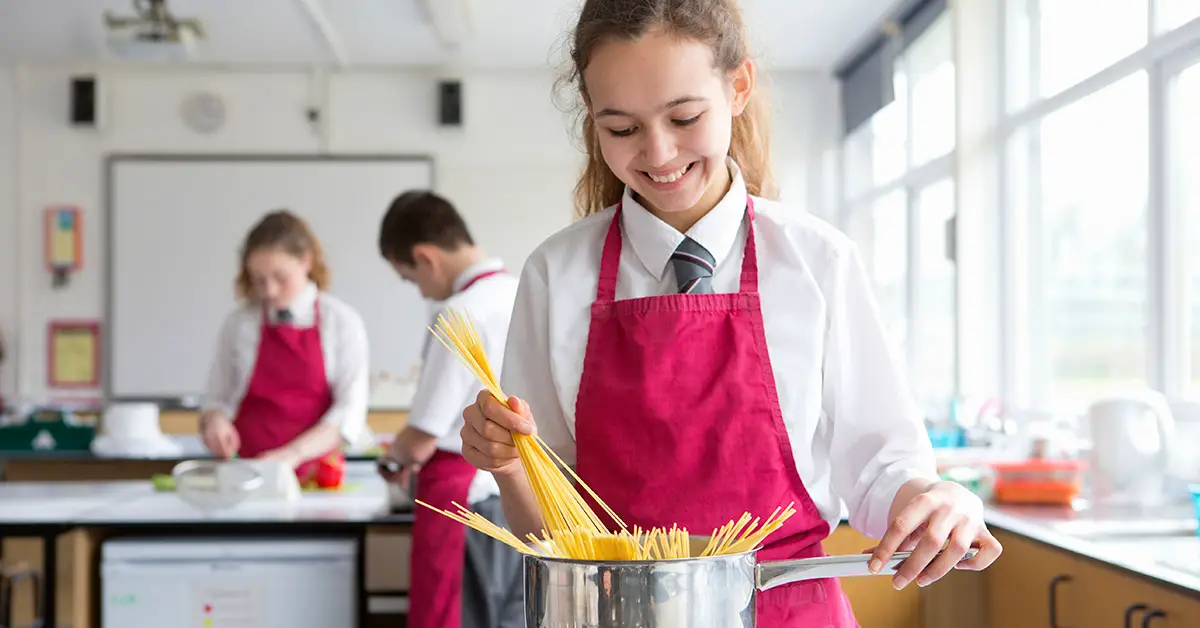Children are becoming adults without basic life skills. Home economics used to be taught regularly, but this class is dwindling in schools. Unfortunately, it shows.
Skills that adults take for granted, — like shopping for groceries, keeping a budget, how interest on credit cards work, how to pay taxes, and cooking — young adults lack. They enter adulthood expected to know how to do these things without having been taught them. And what is school for but to prepare them for the real world?
Bring Back Home Economics
“Home economics” sounds like an outdated class; it used to be taught exclusively to women to help them become good homemakers. However, it’s just as important for boys to know how to sew a button and cook a healthy meal. Rename the class “Life Skills” or something similar, if that would help the stigma of a home ec class. The lessons are still vital. Educators need to prepare their students for adult life whether they choose to go to college or work after high school. [1]
“Sometimes we take for granted that kids know how to wash dishes,” said Susan Turgeson, president of the Association of Teacher Educators for family and consumer sciences. “I never thought I was going to have to explain, step by step, how to put the drain plug in, the amount of soap to be used.”
Unfortunately, these kinds of classes are dwindling. In 2012, only 3.5 million students enrolled in a home economics-type class, a 38% decrease over the decade. [2] This could be due to the rise of testing in schools. Any class that can’t be scored on a basic scale is often assumed to be less important than more academic classes. This becomes a larger issue. When schools occupy themselves with academia and grades, they fail to prepare students for life beyond education. Some students are unaware of how property tax works or how to iron a shirt. After all, they were never taught about these things.
However, home economics, now also called “family and consumer sciences classes”, teach more than sewing and cooking. It teaches personal finance, child development, how to manage healthy relationships, and how to balance home and work responsibilities. Learn that in European history or algebra class.
Should Kids Learn Home Economics from Parents?
Some people argue that kids should learn these basic skills from their parents. Ideally, that would be wonderful but that often doesn’t happen. For one, some parents don’t have these skills themselves. Secondly, some parents forget about these lessons until it’s time for kids to leave home. Thirdly, teaching kids about financials and similar topics could expose them to their parent’s business, a potentially uncomfortable situation. Additionally, some parents just don’t have the time.
Some children live in broken homes without the same parental support and advantages as their peers. We don’t live in a perfect world. Still, they deserve to be equally equipped for adult life.
“In the good old days you got that at home,” said Megan Vincent, an FCS education specialist for the state of Montana. “But now you have two working parents … these courses fill the gaps for what parents can no longer do.” [3]
Begin Adult Life with Confidence
High school is the ideal time to teach home economics. Students are thinking about their futures and eager to gain independence. They want to feel like adults. Most importantly, they want to feel ready for the adult world. Home economics is like imparting secret “grown-up” knowledge to them, knowledge that can help them succeed after they graduate.
Above all, life skills teach confidence. In cooking demonstrations, students learn how to cope with failures. Burned edges could be sliced off. A watery gravy could be fixed. Overcooked meat could still be eaten.
“People don’t need to have perfection — you have to know what are the failures that are OK,” said Carol Werhan, an FCS educator and member of the board of the American Association of Family and Consumer Sciences. “Just because you have a flop in the kitchen doesn’t mean it needs to be brought up at the dinner table.”
Most kids aren’t planning on becoming chefs, but what they learn in a cooking class could be helpful in any career, such as juggling multiple tasks, improvisational skills, and innovation. According to Werhan, home economics help develop “a well-rounded, world-literate human being, which makes a great workforce and a great community.”
Even when students learn about something outside of their future career path, the information is useful. Unlike calculus and other subjects, kids don’t complain about the relevance of home ec subjects to their own lives.
“Wait five minutes in FCS, and you’ll use this information later this week and later in life,” Turgeson said.
Add Life Skills to the Curriculum
This isn’t an attack on academic subjects. They have their place in the curriculum. This is a plea to add home economics to that roster as well. Besides, life skills classes can help incorporate knowledge from other subjects. Take fractions or chemistry, for example. They play a major role in cooking and a hands-on home economics class can help these concepts sink in.
“Everything about FCS is really teaching resource management and employability skills, creative and critical thinking — we just do it through food,” explains Turgeson.
So bring back home economics in high schools — the students need it.
References
- “Bring back home economics class because our kids lack basic life skills.” The Dallas Morning News. Marti Harvey. August 4, 2018.
- “Family and Consumer Sciences Secondary School Programs: National Survey Shows Continued Demand for FCS Teachers.” Scholarship. Carol R. Werhan, PhD. 2013.
- “Despite A Revamped Focus On Real-Life Skills, ‘Home Ec’ Classes Fade Away.” NPR. Tove Danovich. June 14, 2018.

